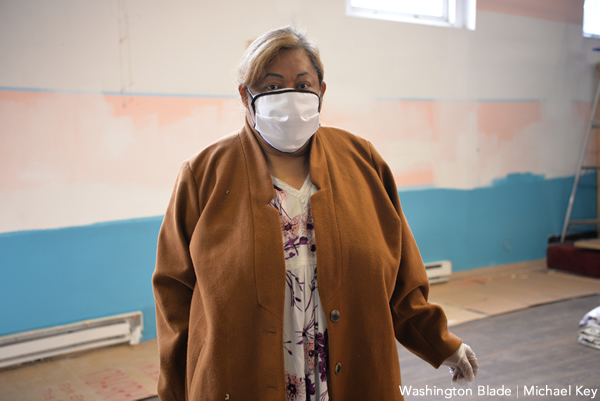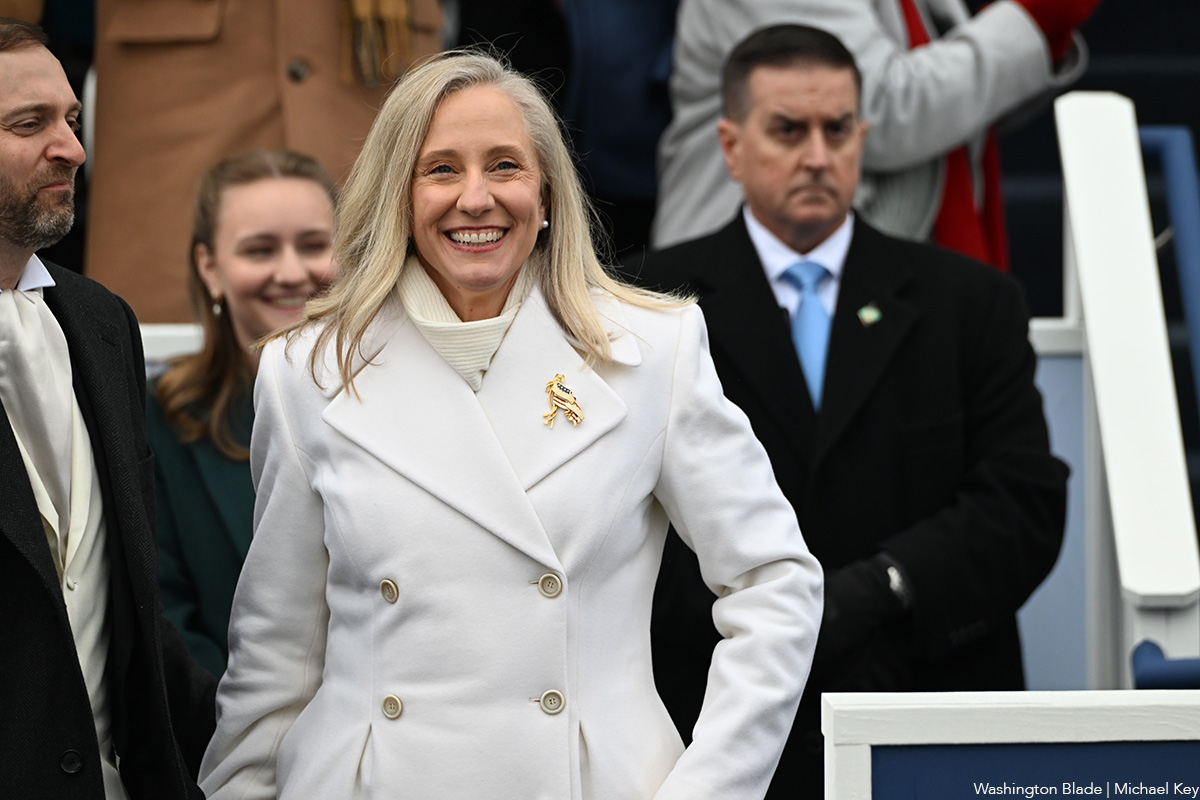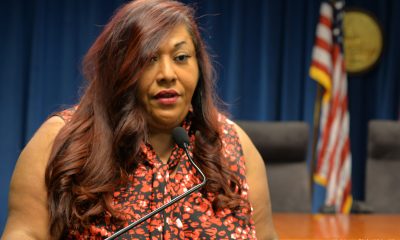Local
Ruby Corado resigns as head of Casa Ruby
Abrupt decision comes after loss of $850K D.C. grant

Ruby Corado, the founder and executive director of the D.C. LGBTQ community services center Casa Ruby, announced in a Facebook live video message that she had resigned from her position as leader of Casa Ruby effective on Friday.
Joining Corado in the Facebook broadcast was Casa Ruby Government Affairs Director Alexis Blackmon, who Corado said would immediately assume the position of interim executive director until the completion of a search for a permanent director.
Last year, Corado disclosed she planned to step down as Casa Ruby’s executive director sometime in 2022 to work full time on an LGBTQ-related consulting practice that she said she had begun part-time while continuing her role as Casa Ruby executive director.
In her Facebook announcement, Corado said she decided to step down at this time in response to an ongoing dispute with the D.C. government which resulted in a decision last week by the D.C. Department of Human Services to discontinue its $850,000 annual grant that has funded Casa Ruby’s emergency “low barrier” shelter for homeless LGBTQ youth and adults.
DHS has declined to disclose its reason for terminating the Casa Ruby grant, saying only that it will continue its full funding for services for LGBTQ youth who experience homelessness through grants to other organizations.
DHS informed Corado of its decision to discontinue the grant less than a week before the end of the fiscal year, with the funding set to stop on Sept. 30. At Corado’s initiative, Casa Ruby launched a GoFundMe fundraising campaign that had raised just over $100,000 as of Friday, a development that Corado says highlights the community’s support for Casa Ruby and its numerous programs, many of which support transgender people and LGBTQ immigrants.
Corado stated in her Facebook announcement that officials at the DHS, who she did not identify, were attempting to use her as a “distraction” to divert attention from the harm Corado said would come from the city agency’s decision to defund the Casa Ruby homeless services program.
Earlier this week, Corado said she believes the defunding of the Casa Ruby homeless program allegedly came in retaliation for a Casa Ruby complaint filed against the DHS by Casa Ruby earlier this year. The complaint charges that a DHS official had acted in a hostile and abusive way toward Corado and Casa Ruby staffers who were operating the homeless shelter.
Corado said she also believes the defunding may be in response to her refusal to agree to a DHS request that she move the Casa Ruby homeless facility to a location in Northeast D.C. that Corado believed to be an unsafe neighborhood for her clients, especially those who are trans. DHS declined a request from the Washington Blade for comment on the Casa Ruby complaint, saying it was under investigation.
In response to a question from the Blade at an Oct. 4 press conference on an unrelated subject, Mayor Muriel Bowser said she would “make the Department of Human Services available” to address the Blade’s question of why Casa Ruby’s funding was not renewed for its LGBTQ shelter program.
“We do business with organizations all the time,” the mayor said. “And sometimes we continue our relationship and other times we don’t. Largely it is based on an evaluation of the effectiveness of the program. So, I can say that.”
“And I can also say there are opportunities all the time for organizations to work with us,” Bowser continued. “And in some rounds or contract rounds it doesn’t work out and in subsequent rounds it might. And that may be the case with Casa Ruby.”
A DHS spokesperson did not respond to a Blade follow-up question this week asking for the reason the agency terminated the Casa Ruby funding.
Corado couldn’t immediately be reached on Friday to determine whether Casa Ruby had raised enough private funds to keep its main shelter open that has operated out of its headquarters building at 7530 Georgia Ave., N.W. In its GoFundMe appeal, Corado said the shelter might be forced to close on Friday.
Blackmon, an African American trans woman, recently received a degree from Georgetown University in the field of nonprofit management, according to Corado, who called Blackmon a highly committed and knowledgeable Casa Ruby team member “who everybody loves.”
Corado also stated in her Facebook broadcast that she will take a three-month sabbatical after which she will return to develop a stepped up private fundraising program for Casa Ruby so that the organization will no longer be dependent on D.C. government funding.
On the same day Corado announced her resignation, the local nonprofit homeless services organization Covenant House Greater Washington announced it was opening on Friday a homeless facility for LGBTQ youth in the city’s Deanwood neighborhood in Ward 7.
“Covenant House Greater Washington is pleased to announce SHINE — a new safe space initiative created for LGBTQ+ populations,” the group said in a statement. “The program will provide emergency shelter, crisis stabilization and short-term housing options to young people in the greater Washington region.”
The statement says the facility, a three-story building, consists of 24 beds, case management services, and “an array of support from various community-based organizations currently working with LGBTQ+ youth.”
The new Covenant House facility adds to the LGBTQ youth homeless facilities currently being operated by Casa Ruby and two other LGBTQ organizations for more than a decade — the Wanda Alston Foundation and SMYAL, the D.C. LGBTQ youth advocacy and services organization.
The Washington Post reports that the DHS awarded Covenant House a $648,000 grant to create and operate its new LGBTQ youth homeless facility.
In its statement announcing the opening of the new facility, Covenant House said the facility will be led by its newly hired program director, Taylor Chandler Walker, a trans woman who has been involved with local LGBTQ organizations; including Capital Pride Alliance, Us Helping Us, and the LGBT Budget Coalition.
District of Columbia
Capital Stonewall Democrats elect new leaders
LGBTQ political group set to celebrate 50th anniversary

Longtime Democratic Party activists Stevie McCarty and Brad Howard won election last week as president and vice president for administration for the Capital Stonewall Democrats, D.C.’s largest local LGBTQ political organization.
In a Feb. 24 announcement, the group said McCarty and Howard, both of whom are elected DC Advisory Neighborhood Commissioners, ran in a special Capital Stonewall Democrats election to fill the two leadership positions that became vacant when the officers they replaced resigned.
Outgoing President Howard Garrett, who McCarty has replaced, told the Washington Blade he resigned after taking on a new position as chair of the city’s Ward 1 Democratic Committee. The Capital Stonewall Democrats announcement didn’t say who Howard replaced as vice president for administration.
The group’s website shows its other officers include Elizabeth Mitchell as Vice President for Legislative and Political Affairs, and Monica Nemeth as Treasurer. The officer position of secretary is vacant, the website shows.
“As we look toward 2026, the stakes for D.C. and for LGBTQ+ communities have never been clearer,” the group’s statement announcing McCarty and Howard’s election says. “Our 50th anniversary celebration on March 20 and the launch of our D.C. LGBTQ+ Voter’s Guide mark the beginning of a major year for endorsements, organizing, and coalition building,” the statement says.
McCarty said among the organization’s major endeavors will be holding virtual endorsement forums where candidates running for D.C. mayor and the Council will appear and seek the group’s endorsement.
Founded in 1976 as the Gertrude Stein Democratic Club, the organization’s members voted in 2021 to change its name to Capital Stonewall Democrats. McCarty said the 50th anniversary celebration on March 20, in which D.C. Mayor Muriel Bowser and members of the D.C. Council are expected to attend, will be held at the PEPCO Gallery meeting center at 702 8th St., N.W.
Virginia
Va. activists preparing campaign in support of repealing marriage amendment
Referendum about ‘dignity and equal protection under the law’

Virginia voters in November will vote on whether to repeal their state’s constitutional amendment that defines marriage as between a man and a woman.
Democratic Gov. Abigail Spanberger on Feb. 6 signed House Bill 612 into law. It facilitates a referendum for voters to approve the repeal of the 2006 Marshall-Newman Amendment. Although the U.S. Supreme Court’s Obergefell ruling extended marriage rights to same-sex couples across the country in 2014, codifying marriage equality in Virginia’s constitution would protect it in the state in case the decision is overturned.
Maryland voters in 2012 approved Question 6, which upheld the state’s marriage equality law, by a 52-48 percent margin. Same-sex marriage became legal in Maryland on Jan. 1, 2013.
LGBTQ advocacy groups and organizations that oppose marriage equality mounted political campaigns ahead of the referendum.

Equality Virginia has been involved in advancing LGBTQ rights in Virginia since 1989.
Equality Virginia is working under its 501c3 designation in conjunction with Equality Virginia Advocates, which operates under a 501c4 designation, to plan campaigns in support of repealing the Marshall-Newman Amendment.
The two main campaigns on which Equality Virginia will be focused are education and voter mobilization. Reed Williams, the group’s director of digital engagement and narrative, spoke with the Washington Blade about Equality Virginia’s plans ahead of the referendum.
Williams said an organization for a “statewide public education campaign” is currently underway. Williams told the Blade its goal will be “to ensure voters understand what this amendment does and why updating Virginia’s constitution matters for families across the commonwealth.”
The organization is also working on a “robust media and voter mobilization campaign to identify and turn out voters” to repeal Marshall-Newman Amendment. Equality Virginia plans to work with the community members to guarantee voters are getting clear and accurate information regarding the meaning of this vote and its effect on the Virginia LGBTQ community.
“We believe Virginia voters are ready to bring our constitution in line with both the law and the values of fairness and freedom that define our commonwealth,” said Equality Virginia Executive Director Narissa Rahaman. “This referendum is about ensuring loving, committed couples and their families are treated with dignity and equal protection under the law.”
The Human Rights Campaign has also worked closely with Equality Virginia.
“It’s time to get rid of outdated, unconstitutional language and ensure that same sex couples are protected in Virginia,” HRC President Kelley Robinson told the Blade in a statement.
District of Columbia
D.C. police arrest man for burglary at gay bar Spark Social House
Suspect ID’d from images captured by Spark Social House security cameras

D.C. police on Feb. 18 arrested a 63-year-old man “of no fixed address” for allegedly stealing cash from the registers at the gay bar Spark Social House after unlawfully entering the bar at 2009 14th St., N.W., around 12:04 a.m. after it had closed for business, according to a police incident report.
“Later that day officers canvassing for the suspect located him nearby,” a separate police statement says. “63-year-old Tony Jones of no fixed address was arrested and charged with Burglary II,” the statement says.
The police incident report states that the bar’s owner, Nick Tsusaki, told police investigators that the bar’s security cameras captured the image of a man who has frequently visited the bar and was believed to be homeless.
“Once inside, the defendant was observed via the establishment’s security cameras opening the cash register, removing U.S. currency, and placing the currency into the left front pocket of his jacket,” the report says.
Tsusaki told the Washington Blade that he and Spark’s employees have allowed Jones to enter the bar many times since it opened last year to use the bathroom in a gesture of compassion knowing he was homeless. Tsusaki said he is not aware of Jones ever having purchased anything during his visits.
According to Tsusaki, Spark closed for business at around 10:30 p.m. on the night of the incident at which time an employee did not properly lock the front entrance door. He said no employees or customers were present when the security cameras show Jones entering Spark through the front door around 12:04 a.m.
Tsusaki said the security camera images show Jones had been inside Spark for about three hours on the night of the burglary and show him taking cash out of two cash registers. He took a total of $300, Tsusaki said.
When Tsusaki and Spark employees arrived at the bar later in the day and discovered the cash was missing from the registers they immediately called police, Tsusaki told the Blade. Knowing that Jones often hung out along the 2000 block of 14th Street where Spark is located, Tsusaki said he went outside to look for him and saw him across the street and pointed Jones out to police, who then placed him under arrest.
A police arrest affidavit filed in court states that at the time they arrested him police found the stolen cash inside the pocket of the jacket Jones was wearing. It says after taking him into police custody officers found a powdered substance in a Ziploc bag also in Jones’s possession that tested positive for cocaine, resulting in him being charged with cocaine possession in addition to the burglary charge.
D.C. Superior Court records show a judge ordered Jones held in preventive detention at a Feb. 19 presentment hearing. The judge then scheduled a preliminary hearing for the case on Feb. 20, the outcome of which couldn’t immediately be obtained.


















